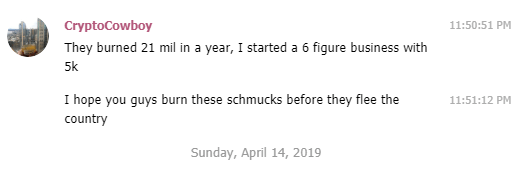California’s Thor Blames Regulators for its Own $21 Million Demise

Icelandic bitcoin miners are consuming too much energy, according to locals.
Regulators can be blamed for just about everything. The team behind the Thor token is pointing the finger at them for the shuttering of their own operations.
However, given Thor raised an impressive $21 million for its crypto project just last year, the excuse is falling on many deaf ears.
There was speculation that something was amiss at the company before it made its announcement this week. For example, Thor reportedly locked its Telegram account so that users could not make comments.
Some Thor token holders took matters into their own hands:
https://twitter.com/Kob0L/status/1115698639886782466
A Little Background
The San Francisco-based company held its ICO in 2018. It managed to raise $21 million through the issuance of 50 million tokens.
Thor’s goals were mighty and included setting out to disrupt the trillion-dollar gig economy through the use of the blockchain.
Its blockchain project was to be built on Neo to provide gig economy workers access to things like healthcare and retirement planning options.
It boasted “creating a blockchain-powered smart gig economy for the future.”
The tokens, however, were never listed on any exchange to be traded.
Fail, Then Blame Someone Else
Thor’s co-founder and CEO David Chin postured that Thor was needed to stand up for gig workers but regulators got in the way. The team set out to deliver “useful and accessible products for 1099 gig economy companies.”
He said regulatory environments were among many other factors that prevented it from being able to provide for those needs.
“Unfortunately, we did not achieve the commercial success we were looking for. Thor ran into many regulatory challenges while operating that prevented us from achieving what we set out to in our white paper.”

When In Trouble, Hide
In seemingly trying to justify why it had gone radio silent about the company’s status, Chin said “sorry.”
“Blame them, not us” types of comments don’t go over well with investors. No matter, this is how Chin responded. He said “business and legal constraints” prevented Thor execs from being able to give token holders a heads up that it was going belly up.
“We have been working behind the scenes to explore all possible options, including finding a way to raise enough capital to face the lack of sales or finding the company a new home where our technology could benefit from more resources.”
Shutting Down The Rumor Mill
Rumors of some nefarious happenings at Thor had picked up before the shuttering announcement.
One particular standout related to Matthew Lawler, Thor’s other co-founder and former chief design officer. The rumor was the company offered him THOR tokens in exchange for $10,000.
To this, Chin stated:
“Matt Lawler was someone that reached out to us about an acquisition months prior. His response has been to harass and insult community and team members.”
Chin acknowledged he was open to Thor being acquired but argued the project had “not been able to find the right fit for an acquisition at this time.”
Dean Jeffs of NEO News Today challenged Chin about a screenshot circulating in which the Thor CEO allegedly private messaged a community member on Twitter, calling Thor a “failed project.” The reason he gave was simply, it had no sales.

Jeffs said the screenshot also shows Chin claiming that the “gig economy didn’t need the solutions that were talked about in the whitepaper.”
Chin responded:
“Companies’ hesitation and doubts of cryptocurrency had a major effect on sales and adoption. Thor was not able to gain traction and achieve commercial success.”
All Thor code and products will remain open source. The community will still be able to use, modify, or fork for its benefit, Chin stated.